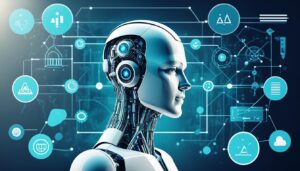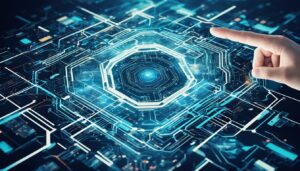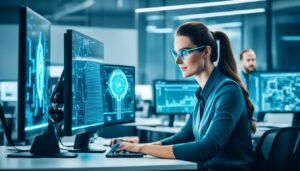
Hello, everyone! Welcome to a fascinating journey into the future of technology with AI.
AI’s growth has been amazing, influencing big data, robotics, and the IoT. We’ll look into its remarkable progress and future possibilities.
Key Takeaways:
- AI has revolutionized industries like big data, robotics, and IoT.
- Generative AI, like OpenAI’s GPT, has boosted AI’s capabilities and fame.
- 42% of big businesses have adopted AI, with another 40% planning to.
- AI’s future impact includes better automation, job changes, and concerns about data privacy and climate change.
- Using AI responsibly is key to unlocking its potential and improving our future.
The Impact of AI on Business Automation
AI has changed how businesses operate and make decisions. Today, about 55% of businesses use AI in some way. This has made automation common across different industries.
AI has greatly improved how companies talk to customers. Many use AI chatbots and digital helpers for simple conversations. This saves time for human agents to tackle complex tasks. It also betters the customer experience.
AI in automation also helps in analyzing lots of data quickly. This makes decision-making faster and smarter. Businesses can react fast to market changes thanks to AI.
The rise of AI has sparked job disruption fears. AI replaces jobs that are routine and predictable. Yet, it’s important to note that AI creates new job openings too. Areas like machine learning and data analysis are growing. AI helps workers focus on creative and complex jobs that need critical thinking.
Adjusting to AI in the workplace means employees need to learn new skills. They might need to learn programming languages or data analysis. Upskilling helps people thrive with AI in their jobs.
In short, AI has a big effect on how businesses automate. It makes operations smoother and decisions smarter. It opens up new chances for work. Even with job disruption worries, AI improves industries and benefits workers and businesses alike.
“AI streamlines operations, enhances decision-making, and creates new opportunities.”
The Advantages of AI in Business Automation:
- Increased efficiency through automated processes
- Improved customer interactions with AI-powered chatbots and digital assistants
- Real-time data analysis for faster and more informed decision-making
- Creation of new job opportunities in AI-related fields
- Augmentation of human workers in more skilled and creative positions

Data Privacy and Regulation in the Age of AI
As technology grows rapidly, AI’s use in different industries brings up data privacy concerns and the need for regulations. AI and data privacy are closely linked. This is because companies use a lot of data to teach AI models and make their systems better.
The Federal Trade Commission (FTC) began looking into whether OpenAI, a top AI firm, broke European data laws. This shows how crucial it is to follow data privacy rules and best practices with AI.
The Biden-Harris administration is tackling these issues by creating an AI Bill of Rights. It stresses the importance of data privacy and being open in AI businesses. They see the need for safety measures and being responsible in the AI world.
The rules about AI and privacy are changing fast, with a focus on intellectual property and privacy. As AI grows, our regulations need to keep up. We must ensure AI is used carefully to protect people’s privacy rights.
The U.S. is thinking about tougher AI regulation for ethical and privacy reasons. They want to encourage innovation but also protect people’s privacy and rights in our digital world.
AI’s rise brings legal issues and potential industry upsets. It’s vital to get through these legal issues and tackle problems related to data privacy, intellectual rights, and ethics.
AI affects industries and brings up big legal challenges that need detailed regulatory rules. This includes creating clear rules for data handling and sharing, and dealing with biases and unfairness in AI systems.
As we deal with AI’s potential and challenges, it’s key for lawmakers, industry leaders, and legal minds to work together. They need to make strong rules that allow for innovation but also protect privacy and ethical values.

| AI and Data Privacy | AI Regulation | Legal Challenges |
|---|---|---|
| Concerns over data privacy in AI | The need for comprehensive regulations | Addressing biases and discrimination in AI |
| FTC investigation into OpenAI | The Biden-Harris AI Bill of Rights | Establishing clear guidelines on data usage |
| Evolving legal landscape | Stricter regulations and accountability | Fostering innovation while upholding ethical standards |
Conclusion
Looking ahead, the future of AI promises big changes across many fields. Industries like manufacturing, healthcare, and transportation will see major transformations. AI will change the way we work and live.
Businesses that use AI can become more productive and make better decisions. But, we must also think about the risks. Job losses and biases in AI are real concerns.
We need to use AI responsibly to ensure a good future. This means thinking about ethics and being transparent. Balancing the benefits and risks will help us fully use AI to improve our world.
FAQ
What is AI’s impact on various industries?
How does AI affect business automation?
Are there any risks associated with AI?
How is data privacy and regulation addressed in the age of AI?
What is the future of AI?
Source Links
- https://builtin.com/artificial-intelligence/artificial-intelligence-future
- https://www.pewresearch.org/internet/2018/12/10/improvements-ahead-how-humans-and-ai-might-evolve-together-in-the-next-decade/
- https://www.simplilearn.com/future-of-artificial-intelligence-article






